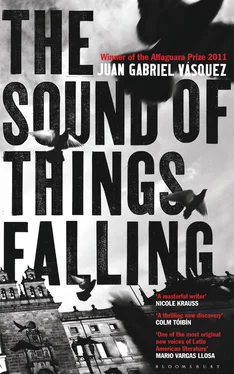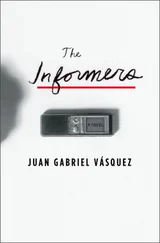Something happened in that instant in her gaze, her green eyes opened slightly wider, her narrow eyebrows arched as if they’d been drawn on again, and her mouth, her mouth with blood-red lips, gestured in a way I’d not seen before. I had no way of proving it, and commenting on it would have been imprudent or stupid, but at that moment I thought: That’s a little girl’s expression. That’s what you were like when you were little .
And then I heard her say, ‘And have you been back since then? Because I haven’t, I’ve never been back. The place is falling to pieces, from what I’ve heard. But we could go anyway, see what’s there, see what we remember. How’s that sound?’
Soon we were driving down the highway towards Medellín at the hottest hour of the day, moving along the ribbon of asphalt just as Ricardo Laverde and Elaine Fritts had done twenty-nine years earlier, and not only that, but doing so in the same bone-coloured Nissan in which they’d driven. In a country where it’s quite common to see cars from the 1960s in the streets — a Renault 4, a Fiat here and there, Chevrolet trucks that might even be fifteen years older — the survival of a jeep was neither miraculous nor extraordinary, there are hundreds like this on the roads. But anyone could see that this was not just any Nissan jeep, but rather the first big present Ricardo Laverde bought for his wife with the money from the flights, the marijuana money. Twenty-nine years before, the two of them had travelled around the Magdalena Valley as we were doing now; they had kissed while sitting on this seat; right here they’d talked about having children. And now their child and I were occupying those same places and perhaps feeling the same humid heat and the same relief at accelerating and getting air to blow in the windows, so we had to raise our voices to hear each other. It was either raise our voices or die of heat with the windows rolled up, and we preferred the former. ‘This jeep still exists,’ I said in a forced tone, sounding like an actor in a theatre that was too big.
‘How about that,’ said Maya. Then she raised a hand and pointed to the sky. ‘Look, military planes.’
I heard the sound of the planes that were passing over our heads, but when I looked up I only saw a flock of turkey vultures tracing circles against the sky. ‘I try not to think of Dad when I see them,’ said Maya, ‘but I can’t help it.’ Another squadron flew over in formation and this time I saw them: the grey shadows crossing the sky, the jet engines shaking the air. ‘That was the inheritance he wanted,’ said Maya. ‘The hero’s grandson.’ The road was suddenly filled with uniformed lads armed with rifles that hung across their chests like sleeping animals. Before driving onto the bridge over the Magdalena we slowed down so much and passed so close to the soldiers that the wing mirror almost brushed the barrels of their rifles. They were boys, sweaty, scared kids whose mission, guarding the military base, seemed too big for them, just as their helmets and uniforms were, and those stiff leather boots in these cruel tropics. As we passed beside the fence that surrounded the base, a structure covered in green canvas and crowned with an elaborate labyrinth of barbed wire, I saw a green sign with white letters, No Photography , and another in black letters on a white background: Human rights, the responsibility of all . On the other side of the fence military trucks could be seen driving on a paved road; beyond them, exhibited like a relic in a museum, a Canadair Sabre balanced on a sort of pedestal. In my memory the image of this plane, which Ricardo Laverde liked so much, is forever linked to Maya’s question: ‘Where were you when they killed Lara Bonilla?’
People of my generation do these things: we ask each other what our lives were like at the moment of those events — almost all of which occurred in the 1980s — which defined or diverted them before we knew what was happening to us. I’ve always believed that in this way, verifying that we’re not the only ones, we neutralize the consequences of having grown up in that decade, or we mitigate the feeling of vulnerability that has always accompanied us. And those conversations tend to begin with Lara Bonilla, the Minister of Justice. He had been the first public enemy of drug trafficking, and the most powerful of the legal ones; the method of the hit man on the back of a motorbike, where a teenager approaches the car in which the victim is travelling and empties a Mini Uzi into it without even slowing down, began with his murder. ‘I was in my room, doing my chemistry homework,’ I said. ‘And you?’
‘I was ill,’ said Maya. ‘Appendicitis, imagine, I’d just had surgery.’
‘Do kids get that?’
‘It’s so cruel, but yes. And I remember the commotion at the clinic, the nurses rushing in and out. It was like being in a war movie. Because they’d killed Lara Bonilla and everyone knew who’d done it, but no one knew that could happen.’
‘It was something new,’ I said. ‘I remember my dad in the dining room. His head in his hands, elbows on the table. He didn’t eat anything. He didn’t say anything either. It was something new.’
‘Yes, that day we went to bed changed,’ said Maya. ‘A different country, wasn’t it? At least that’s how I remember it. Mom was scared. I looked at her and saw her fear. Of course, she knew all sorts of things that I didn’t.’ Maya was quiet for a moment. ‘And when Galán was killed?’
‘That was at night. It was a Friday in the middle of the year. I was. . Well, I was with a friend.’
‘Oh, very nice,’ said Maya with a slanted smile. ‘You having a fine old time while the country falls to pieces. Were you in Bogotá?’
‘Yes.’
‘Was she your girlfriend?’
‘No. Well, she was going to be. Or that’s what I thought.’
‘Oops, a frustrated love,’ Maya laughed.
‘At least we spent the night together. Even though it was obligatory.’
‘The After Curfew Hour Lovers,’ said Maya. ‘Not a bad title, don’t you think?’
I liked seeing her like this, suddenly cheerful, I liked the little barely visible lines that appeared beside her eyes when she smiled. In front of us there was now a truck loaded with huge milk containers, big metal cylinders like unexploded bombs on top of which three shirtless teenagers were riding. Seeing us caused them inexplicable laughter. They waved to Maya, blew kisses at her, and she put the jeep into second gear and pulled into the other lane to overtake them. As she did so she blew a kiss back to them. It was a teasing, playful act, but there was something in the melodramatic way she closed her lips (and in the whole movie-star gesture) that filled the moment with an unexpected sensuality, or at least that’s how it seemed to me. On my side of the road, two water buffalo were bathing in a sort of marsh that opened up between the shrubs. Their wet horns glistened under the sun, their manes stuck to their faces. ‘And the day of the Avianca plane?’ I said.
‘Oh, the famous plane,’ said Maya. ‘That really fucked everything up, didn’t it.’
Once the presidential candidate Galán was dead, his policies, and among them the fight against drug trafficking, were inherited by a very young provincial politician: César Gaviria. In his attempt to take Gaviria out of the picture, Pablo Escobar had a bomb planted on a passenger airline that flew — that would have flown — the Bogotá—Cali route. Gaviria, however, did not even board the plane. The bomb exploded just after take-off, and the remains of the disintegrated plane — including three passengers who were apparently not killed by the bomb but by the impact — fell over Soacha, the same place where Galán had fallen, shot on the wooden campaign platform. But I don’t think this coincidence means anything.
Читать дальше












